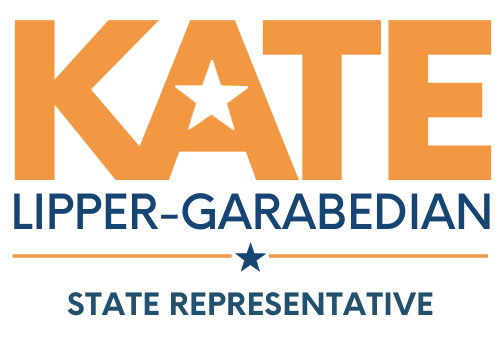State Representative Kate Lipper-Garabedian Joined Massachusetts House to Pass $10.9 Billion Transportation and Infrastructure Bill
BOSTON – Thursday, June 23, 2022 – Last week, State Representative Kate Lipper- Garabedian (D-Melrose) joined the Massachusetts House of Representatives to pass a transportation and infrastructure bill authorizing $10.9 billion for projects, including $400 million for the Massachusetts Bay Transportation Authority (MBTA) to address ongoing safety concerns identified by the Federal Transit Administration’s Safety Management Inspection and $250 million for the East-West passenger rail project.
"I was pleased to join a unanimous House in voting to pass an $11 billion bond bill authorizing investments in transportation infrastructure in Massachusetts,” said Representative Kate Lipper-Garabedian. “When taking this vote, I was particularly mindful of my constituents in the 32nd Middlesex District, who derive much value from our proximity to public transportation. Recently, the MBTA cut Orange Line service in response to federal findings regarding insufficient staffing. This bill authorizes $400 million to address MBTA safety concerns, as well as sustainable modernization and improvement.”
“Ensuring that the Commonwealth’s transportation infrastructure is adequately funded is a top priority for the House, which is why I’m proud of the legislation passed today,” said House Speaker Ronald J. Mariano (D-Quincy). “In addition to significant funding for roadway and bridge projects, this bill also recognizes the importance of providing further support for the MBTA in their ongoing effort to address safety concerns, and for the ever-important East-West Rail project. I want to thank Chairs Michlewitz, Straus, and Gregoire, as well as all my colleagues in the House, for the hard work required to get this done.”
"This legislation sets the table for the next administration to take full advantage of the additional billions of dollars, both state and federal, for critical transportation projects throughout the state,” said Representative William Straus (D- Mattapoisett), House Chair of the Joint Committee on Transportation. “The House has wisely used the bill as an opportunity to again demonstrate its commitment to roads, bridges and public transit.”
“This legislation provides meaningful and generational investments to the roads, bridges and transportation systems throughout our Commonwealth,” said Representative Danielle Gregoire (D-Marlborough), House Chair of the Joint Committee on Bonding, Capital Expenditures and State Assets. “Because of the foresight and diligence of Speaker Mariano, we were able to engage early-on legislators from across the state on how this legislation could be most impactful to fully meet the needs of our Commonwealth. I am grateful to the Speaker for the opportunity to work on this critical piece of legislation and am thankful to my colleagues, Chairman Michlewitz and Chairman Straus for their partnership in bringing this to the House floor.”
Other highlights of the bill include:
• $2,812,457,157 for projects on the interstate and non-interstate federal highway system
• $1,270,000,000 for non-federally aided roadway and bridge projects and for the nonparticipating portion of federally aided projects
• $85,000,000 for pavement and surface conditions on non-federally aided roadways
• $25,000,000 for pavement and surface conditions on municipal roadways
• $20,000,000 for grants to municipalities under the Complete Streets Funding Program
• $25,000,000 for grants to Transportation Management Associations
• $82,000,000 for rail improvements
• $64,900,000 for projects of regional transit networks and facilities
• $1,375,000,000 for sustainable transit system modernization and rail improvements
• $114,100,000 for the Airport Improvement Program
• $145,000,000 for multi-modal transportation planning and programming
• $10,000,000 for a public realm improvement program
• $3,500,000,000 for projects funded with discretionary federal grant funds
• $25,501,000 for the Mobility Assistance Program
• $200,000,000 for projects that reduce emissions such as public alternative fueling stations and electric vehicle charging infrastructure, programs promoting e-bikes and public transportation, replacement of high-emissions vehicles, electric vehicles for hire and carsharing, electric school buses, electric short-haul freight, and delivery trucks
Additionally, the bill:
• Updates safety requirements to be met prior to excavation projects
• Authorizes vehicles or trailers used for maintenance, construction activities in highway work zones to display flashing blue lights with a permit from the registrar
• Requires the MBTA to provide parking alternatives to commuters when it demolishes or reconstructs parking lots or garages it owns or operates
• Requires MassDOT, in consultation with the Comptroller, to develop and operate a publicly accessible and searchable database to report on this bill’s expenditures and any project receiving federal funding from the federal Infrastructure and Investment in Jobs Act of 2021
• Establishes a commission to review and receive testimony concerning public entities, including those that may be created by statute in the future, with the ability to design, permit, construct, operate and maintain passenger rail service that meets the standards of the Final Alternatives in the East-West Passenger Rail Study Final Report issued by MassDOT in 2021 “An Act relative to Massachusetts’s transportation resources and climate” (H.4897) passed the House of Representatives 155-0. It now goes to the Senate for their consideration.
